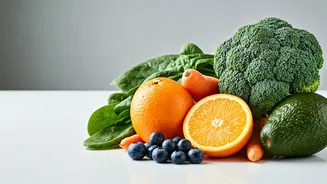Food for Healing
Recovering from cancer involves a holistic approach, and nutrition plays a critical role in this process. Certain foods contain properties that could assist
in reducing inflammation, bolstering the immune system, and providing the necessary building blocks for cellular repair. Incorporating these foods into your diet could give the body the fuel it needs to recover effectively. It’s important to remember that dietary changes should complement, not replace, medical treatments, and consulting healthcare professionals is crucial. Focus on creating a diet rich in nutrients to strengthen your body's defenses and provide it with the resources necessary for healing. Remember that what you eat can profoundly impact your physical and emotional well-being throughout your cancer journey, and beyond, supporting resilience and fostering hope.
Berries: Antioxidant Power
Berries, such as blueberries, strawberries, and raspberries, are packed with antioxidants. These compounds help combat free radicals that could damage cells, potentially supporting the body's natural defenses and repair mechanisms. Their vibrant colors signify their rich antioxidant content. Including berries in your daily meals might provide a tasty and effective way to protect against cellular damage. Consider adding them to smoothies, oatmeal, or enjoying them as a standalone snack. The antioxidants found in berries might also contribute to reduced inflammation and support the overall health of tissues in the body. Opting for a variety of berries ensures a broader range of nutrients, providing a well-rounded approach to nutritional support during recovery.
Leafy Greens: Nutrient Rich
Leafy green vegetables like spinach, kale, and collard greens are nutritional powerhouses, offering a wealth of vitamins, minerals, and fiber. These vegetables support various bodily functions and promote overall well-being. Consuming leafy greens could help maintain a healthy digestive system, as fiber aids in regular bowel movements. Their high content of vitamins A, C, and K, along with folate, further contributes to immune support. These vegetables are also low in calories, making them a great addition to any diet without significant weight gain. Try incorporating them into salads, soups, or as a side dish to your main meals. The versatility of leafy greens makes it easy to find enjoyable ways to include them in your diet, and they can offer a valuable contribution to the recovery process.
Cruciferous Vegetables Support
Cruciferous vegetables, including broccoli, cauliflower, and Brussels sprouts, contain unique compounds that could offer protective benefits. These vegetables are known for their glucosinolates, which, when broken down in the body, create substances that might play a role in detoxification. They also provide essential vitamins and fiber. Consider steaming, roasting, or lightly sautéing these vegetables to retain their nutrients and flavor. Regular consumption could enhance the body's natural detoxification processes, and provide essential nutrients for overall health. Embrace these vegetables as part of a varied and balanced diet for potential benefits during recovery, including supporting the body’s natural defense systems. Ensure these foods are cooked correctly to get the most benefits.
Healthy Fats for Healing
Healthy fats, found in avocados, nuts, and seeds, are crucial for cell function and can help reduce inflammation. These fats provide energy and support the absorption of essential nutrients. Avocados are rich in monounsaturated fats, which could benefit heart health, while nuts and seeds are good sources of omega-3 fatty acids, known for their anti-inflammatory properties. Using these fats in your diet supports energy levels and assists in overall well-being. Incorporate avocados into salads or smoothies, snack on a handful of nuts, or add seeds to your meals for an extra nutritional boost. Choose natural, unprocessed sources of these fats to maximize their benefits. These fats could provide a significant support system for healing and general health.
Turmeric's Anti-Inflammatory
Turmeric, a spice commonly used in Indian cuisine, contains curcumin, a compound with potent anti-inflammatory properties. Chronic inflammation can hinder the healing process, and curcumin may help mitigate this issue. Using turmeric in cooking might aid in reducing inflammation, thus supporting your body's natural recovery processes. It can be added to curries, soups, or smoothies. It is often combined with black pepper, as piperine in black pepper enhances curcumin absorption. Consider including turmeric regularly to capitalize on its potential benefits. Its easy incorporation into your diet makes it a simple yet effective way to help the body heal and reduce overall inflammation.
Lean Protein is Key
Protein is the foundation for building and repairing tissues, making it an essential component of a recovery-focused diet. Opting for lean protein sources, such as poultry, fish, beans, and lentils, supports muscle maintenance and repair without the excess fat. Including lean protein ensures the body receives the necessary building blocks for cellular repair and maintenance, which is vital during cancer recovery. These sources also provide essential amino acids needed for various bodily functions. Prepare protein sources using methods like baking, grilling, or steaming to maintain their nutritional value. Making protein a regular part of your meals supports energy levels and assists in restoring the body’s overall strength. A consistent intake of lean protein can play a crucial role in improving your quality of life.
























